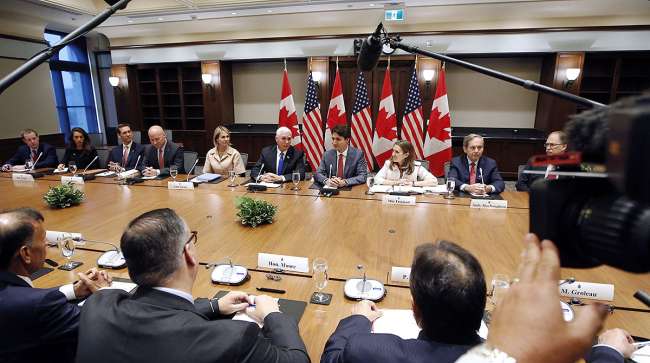Senior Reporter
US House Approves USMCA, Sets Up Early 2020 Senate Vote

[Stay on top of transportation news: Get TTNews in your inbox.]
A landmark new trade deal with Canada and Mexico was approved in the U.S. House of Representatives on Dec. 19, the culmination of monthslong negotiations between House Democratic leaders and the White House on an issue that President Donald Trump campaigned on as a candidate.
The deal will replace the Clinton-era North American Free Trade Agreement, which Trump has for years criticized as being unfair to the United States, despite rebuttals from supporters that it was responsible for creation of the multitrillion-dollar trading alliance between the countries.
Among issues that have been under debate for the new agreement were terms related to Mexican labor laws, environmental regulations and enforceability.
This vote signifies that good policy need not be a zero-sum political game. Even in today’s Washington, good things can still get done together. That spells hope for the American people. #USMCAnow — American Trucking (@TRUCKINGdotORG) December 19, 2019
“On enforcement, we negotiated a historic mechanism never included in a trade agreement before,” said Rep. Richard Neal (D-Mass.), chairman of the tax-writing Ways and Means Committee. “We will now have a facility-specific, rapid response mechanism to address violations of key labor obligations. We have also made great improvements to the environment provisions. The USMCA will now include the highest environmental standards of any trade agreement and will include a new customs verification agreement to enhance enforcement.”
“USMCA will set the stage for billions more in economic activity,” added Ways and Means ranking Republican Rep. Kevin Brady of Texas. “It creates, for the first time, rules for competing in the digital economy, to the advantage of America’s manufacturers and farmers across so many sectors,”
After the House vote, the trade deal advanced to the U.S. Senate where that chamber’s leader, Kentucky Republican Sen. Mitch McConnell, indicated he would likely schedule its consideration after Trump’s impeachment trial. The House voted to impeach the president just one day before it advanced the USMCA measure.
U.S. Trade Representative Robert Lighthizer had referred to the bipartisan agreement reached between lawmakers and his team as the “most momentous day in trade history ever.”
“That day we submitted the USMCA, the Mexico-Canada agreement, with bipartisan support and support of business, labor, agriculture,” Lighthizer told CBS News on Dec. 15.
According to Lighthizer’s office, the new deal is designed to modernize food and agriculture trade, advance rules of origin for automobiles and trucks, and enhance intellectual property protections, among other matters.
Soon after the three countries had signed the deal last year, Republicans had been calling on the Democratic leadership to take it up. White House officials have remained vocal about its potential benefits, and the president has routinely referred to NAFTA as “the worst trade deal ever made.”
“Trump has remained focused on how to keep our economy growing, and he negotiated the largest trade deal in American history, the United States-Mexico-Canada Agreement,” Vice President Mike Pence stated Dec. 12. “The U.S. International Trade Commission says that within five years, the USMCA could add up to $235 billion in new economic growth and 589,000 jobs to the U.S. economy.”
Trucking, freight rail and stakeholders from the labor and business sectors were among groups applauding the announcement after months of negotiations concluded.
“By the nature of our work, truckers know the significance of this victory,” said American Trucking Associations President Chris Spear. “Cross-border trade with our neighbors has become a cornerstone of the American economy. Strengthening this relationship as USMCA does helps secure our economy’s foundation and ensures we will remain competitive in the global marketplace for decades to come.”
#USMCA is a win for American workers. But don’t take our word for it. Here’s the latest list of support from leaders around the country: pic.twitter.com/O1IB8jHsqk — Rep. Richard Neal (@RepRichardNeal) December 19, 2019
“With renewed trade ties, freight railroads stand ready to deliver for rail customers throughout North America and move the goods that allow the U.S. economy to grow and compete in global markets,” added Ian Jefferies, president and CEO of the Association of American Railroads.
AFL-CIO President Richard Trumka cautioned that the agreement is, “far from perfect.” He said, “[USMCA] alone is not a solution for outsourcing, inequality or climate change.”
The Congressional Budget Office estimates that from fiscal 2020 to 2029 the deal could potentially raise government revenue by $2.97 billion.
Want more news? Listen to today's daily briefing:

